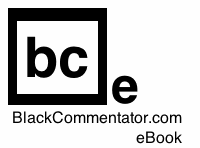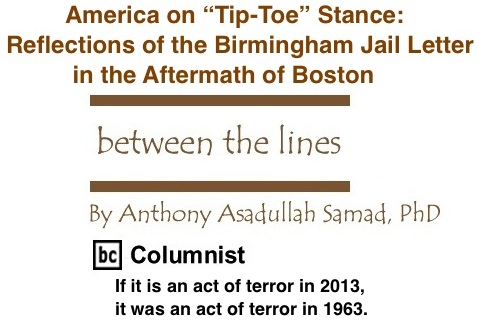


We send our prayers to the people of Boston, and the victims,
of what our President called an “act of terror,” after two bombs
exploded during the Boston Marathon. Tragedy, like terrorism, is
colorless. We should have compassion for any and all persons in times
of tragedy, and we should rebuke terrorism, in all its forms. The evil
behind such an act, or those responsible for any acts of terror, should
be brought to justice. With God’s permission, they will be brought to
justice, for no one has a greater sense of justice than God. But now,
the nation has again been reminded of its vulnerabilities in the return
of the uncertainties that accompany random acts of terror. Each act
“changes our lives” forever, changes how we socialize, changes how we
congregate and changes how we see the world.
Another “new normal” in a world that is not so normal anymore.
Our compassion for and empathy with those directly affected by this
sort of tragedy is a sensible, rational, humane and socially
responsible response, but it doesn’t change the sobering realities of
our new normality. We now have to be overly concerned about where
we are and who is around us. As irrational terrorism has been
racialized over the past twelve years (since 9/11/2001), xenophobia
only foments our suspicions. America is back on “‘tip-toe stance,’
never knowing what to expect next, and is now plagued with inner fears
and outer resentment,” to quote Dr. Martin Luther King, Jr. Tip-Toe
Stance is a state of alarm, or anticipation, that hostility is a social
constant and danger situations are always imminent. It is a quote from
another time, in another irrational moment in our nation’s history.
This lexicon is not specific to the events of Boston.
The Boston bombing only reminds us of a time when the national
conscience had to be pricked and compassion had to be massaged to emit
empathy (or sympathy) for innocent victims of terrorism in America. The
lexicon associated with eminent fears amid imminent dangers was
introduced into the societal conscience by letter, a letter now
considered one of the ten most significant documents of the 20th
Century. The original subject of my column this week was on the
importance of a single letter. In deference to the tragedies of the
moment, we can draw parallels around tragedy and terrorism in America
that have significance in understanding why we all must be
compassionate and vigilant in stemming irrational terrorism in the
aftermath of the Boston tragedy. Why? Because it hasn’t always been the
case in America. Not for everyone.
Fifty years ago this week (April 16th), Dr. Martin Luther King. Jr. was
in the midst of what was considered his most controversial direct
action protest engagement, in Birmingham, Alabama. A boycott and
protest marches were called for Easter week, to protest the treatment
of black customers, the failure to hire black clerks, and maintaining
segregated restrooms and lunch counters nearly nine years after the
Brown decision. Easter, except for Christmas, was (is) the biggest
shopping “holiday” season of the year. King was attacked by white
clergy as being an egregious outside agitator who was being impatient
and unreasonable in his demands. They also questioned why King targeted
Birmingham when he lived in Atlanta. Birmingham was the largest city in
Alabama, with the largest black population. Birmingham was also “the
Capital of Southern Segregation,” having had more unsolved bombings
than any city in America. Because of this heinous practice of
terrorizing black residents, the city became known as
“Bombingham.” I would encourage anyone who has never read this
letter, to read it, absorb it and live by it.
The irony here is that fifty years later, bombings are considered “acts
of terror.” If it is an act of terror in 2013, it was an act of terror
in 1963. Times have changed - but the act, and the impact of the act,
hasn’t. A bombing is a bombing, terror is terror and tragedy is
tragedy.
King was being criticized for leading the protests from afar, and for
putting women and children in “harm’s way.” Harm’s way was Birmingham’s
Chief of Police and Public Safety Director, “Bull” Connor, who used all
the force of the local government to disrupt the boycotts. The youth
joined the protests, often ditching school to join the marches, and
they were locked up. Connor arrested so many of them that the jails
were completely full. Amid these sharp criticisms, King, Ralph
Abernathy and Fred Shuttlesworth joined the protest lines, and thus
were arrested on Good Friday. King’s arrest brought the protests to the
nation’s attention.
While in jail, on April 12th, a full page ad was taken out by white
pastors in the Birmingham newspaper issuing a “Call To Unity,”
condemning King’s actions. King responded on April 16th, with his
“Letter From Birmingham City Jail” (also known as “The Negro Is Your
Brother”), questioning his brethren’s support of unjust law and
advocating of gradualism. Dr. King sensitized them to the state of
terror in which the Negro lived in America, and appealed to their sense
of Christ-like justice. It was a significant moment in American
religion, a test of sincerity, and an exposť in Christian hypocrisy, as
to why the church, and the broader society had little (or no)
compassion, or empathy, for what was happening to the Negro in the
South.
King’s appeal rallied ecumenical support in the North after
the letter was published in several Northern papers. However, despite a
growing movement invigorated by the youth of Birmingham - that included
the March on Washington - the terror continued. Less than three months
after the March on Washington, five months after King wrote his letter,
the world was shocked by the same sense of indiscriminate evil that was
demonstrated in Boston this week.
This year, September 15th to be exact, will commemorate the 50th
anniversary of the most egregious act of the movement, the bombing of
the Sixteenth Street Baptist Church, where four innocent little girls
were killed. The runners and spectators of the Boston Marathon who were
killed and injured, were just as innocent, their deaths senseless. The
outrage is not muted.
We, as a society, can never again allow our compassion and our empathy
to be muted and dictated by our fears. Acts of terror betray us all.
Not to acknowledge them, wherever they occur, deny our sense of
humanity and civility.
Dr. Martin Luther King understood, fifty years ago, what we should all
understand now, in this moment of senseless tragedy. We shouldn’t just
pray for the families impacted. We should all join the call for justice
to be served. Anything less is a scar on all our consciences and
an indictment on our sense of collective humanity. And we shouldn’t
indict any segment of society before all the facts come out - for
injustice anywhere is a threat to justice everywhere. King said that,
too - in the same letter. Wherever injustice is present, justice must
also be present.
We need to pray for us all.

BlackCommentator.com Columnist,
Dr. Anthony Asadullah Samad,
is a national columnist, managing director of the Urban
Issues Forum
and author
of REAL EYEZ: Race, Reality and Politics In 21st Century Popular Culture and Saving
The Race: Empowerment Through Wisdom. His Website is AnthonySamad.com. Twitter @dranthonysamad. Click here to contact Dr. Samad.
 |






